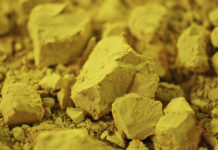
[miningmx.com] — In the wake of last week’s Human Rights Watch report, a number of commentators and other observers have taken a clear and uncompromising stance on whether AngloGold Ashanti should be in the Democratic Republic of the Congo – that we have no business being there until that society has normalized, and peace and democracy reigns. It is a righteous view which certainly ensures that the protagonists’ hands stay clean. Or does it?
AngloGold Ashanti certainly found itself with dirty hands when in January its employees at its exploration camp were forced under duress to hand over $8000 to members of the FNI militia. Incidentally, this payment was not “spotted by external parties’ as some have alleged. It was voluntarily disclosed by us when we became aware of it. Nonetheless, we accept the indictment that we erred in placing our employees in a situation where they were forced to pay this amount or risk their wellbeing.
Does that mean we and other businesses should avoid operating in the DRC, or other such conflict zones, until those societies have fully and irreversibly achieved peace, as your columnist appears to suggest?
The answer to that question is “yes’ if, by being there, we act as an obstacle to progress towards peace and democracy, rather than assisting its advance. However, we would argue that one cannot draw the conclusion that a business presence in such an environment is necessarily a negative one. Particularly where a peace process is in progress, economic activity can, if conducted with integrity, be helpful, or even indispensable.
My colleague Bobby Godsell compares the situation in the DRC to that of KwaZulu-Natal, during the 1990-1994 transitional period. Though as a Ghanaian I am not qualified to make that assessment, as I understand it there was no question from anyone that, in the context of high levels of violence at those times, a withdrawal of economic activity would in any way assist the transition to democracy. Bobby further argues that, as SA emerged from that period in 1994, it was clear that the consolidation of peace and democracy was dependent on, among other things, economic progress.
The DRC, too, has embarked on a difficult road to peace and democracy. Following a regional ceasefire agreement signed in 1999 by six countries in the region, the focus has been on achieving internal peace, and then starting on the journey toward democracy. In this process, in which both South Africa’s President and Deputy President have played key roles, a transitional constitution was agreed in March 2003, and a transitional government created in June of that year. Work on a final constitution is currently underway, and elections are envisaged for next year.
Importantly, the DRC transitional government is recognised by institutions like the African Union and the United Nations. And our mandate to operate derives from that authority whose legitimacy, while not yet recognised universally -as evidenced by the continued existence of armed militia – is extensive. And that authority, and the one that succeeds it after the elections, needs economic progress to sustain it.
That said, we still need to ensure that our presence does more good than harm. How do we think we can do that?
First, our policy must firmly state that no financial or logistical assistance can be given to rebel groups. Where a situation threatens that it may be unavoidable, we need to withdraw.
Second, we will not initiate any contact with such groups. Where such contact takes place unavoidably, at their behest, its nature needs to be recorded and limited so as to ensure it meets the above basic constraints.
Third, continued dialogue must be maintained with legitimate authorities over these matters. We will also maintain communication with relevant NGOs.
And finally, as we continue our local econic development activities in the region we will redouble our efforts to ensure that it is done on a non-partisan basis.
This is how we will seek to keep our hands clean. We believe continuing our activities on this kind of basis will do more for the peace process than those who would prefer to keep their hands clean by advocating an economic “scorched earth’ approach. They might find, should they succeed, that they end up with far dirtier hands than ours.
* Sam Jonah is President of AngloGold Ashanti
Higher grade mining news. Straight to the point. Straight to your mailbox. Subscribe now for miningmx’s free news alerts.











